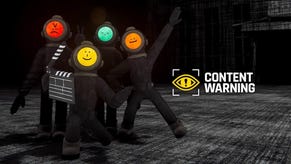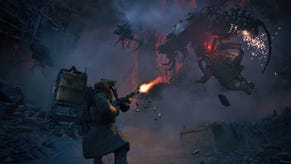The Games Of Christmas '10: Day 3
The third window on our advent calendar is making strange buzzing and throbbing noises. What ever could such emanations mean? What kind of place will be whisked away to if we open this particular portal? Let us dare to find out...
It's... S.T.A.L.K.E.R.: Call of Pripyat

Jim: There was an element of uncertainty about Call Of Pripyat. The omens were disturbing. While by no means it bad game, Clear Sky, Pripyat's precursor, was a deeply flawed experience. Bugs, malformed features, and peculiar game design made it seem like a dismal rehash of the original Stalker game. It wasn't clear whether GSC would be able to return to their original form for the third sequel/expansion in the series. (GSC talk about a genuine “Stalker 2”, which would make these games expansions of a sort.) As it turned out, no, they wouldn't quite return to same themes and standard of Chernobyl, but, instead, would take the same world, engine, and characters, and do something a little different. Some might say better.
We had to wait a little while for this. The news from Russian and German versions of the game was that it was good. I patiently waited, becoming increasingly optimistic about it. Six months later the English language version finally landed and, lo, it was good.
While Call Of Pripyat is much the same open-ended shooter with RPG elements, it is more open ended than ever before, and exhibits even more of the RPG elements that made the previous games so interesting. There were set pieces that could play out in a number of ways, depending on your dialogue choices. There were hidden side-quests, there were weapon and armour modifications that could be made cheaper by getting the tech drunk on vodka, and more advanced by scouring the world for tools: tiny objects among the vastness of Stalker's levels. It felt, ironic given the desolate setting, like a far richer game world than either of the previous titles.
To say the world is vast is perhaps not quite the right word: Call of Pripyat's three large levels were as big as perhaps two or three of the largest individual areas from the original outings in the zone, and they were littered with fresh weirdness – new facilities and ruined buildings, new anomalies, this time often warping the trees and land. They didn't feel quite as naturalistic as before - a little more game-like, perhaps - but they were not short on atmosphere, or on action. The distortion of Stalker's world was far more physical in 2010. It felt like GSC were being more creative, more expressive. This was no where better evidenced than in Pripyat itself: the abandoned city finally becoming a playground, rather than a linear combat sequence, and delivering a story all its own: of trapped soldiers, struggling to make sense of what had happened in the events after the original game, fighting a desperate fight in the hollow streets at the heart of the disaster.
The best things about the game - the need to survive, the AI interactions, the crushing violence of the combat – they all remained intact. Stronger, even. Pripyat was a mutant, but a potent, nimble one.
And it surprised me. Several times. Not just by being fantastic overall, but in little tricks and unexpected events: the deliberate surprised that GSC had written into it. It wasn't as frightening, of course. The claustrophobic nightmare of Shadow Of Chernobyl's underground sequences were notable by their absence, with the one key underground sequence in Pripyat actually being a far more gung ho “big fight” sequence which you have to prepare a team of allies to face. But it still managed to pull out sequences of events that I couldn't have anticipated, and strange little vignettes for me to investigate and puzzle over.
This is probably the most interesting first person shooter of 2010, and certainly one of the finest games of the year. I will, no doubt, find myself returning to it again and again as I wait, impatiently, for GSC to deliver that genuine sequel, and the one true herald of the sandbox shooter worlds we were promised.
Alec: Pripyat made me love STALKER again. It seems someone, somewhere always gets incredibly cross whenever I mention that I didn't enjoy Clear Sky, as though I'm contravening some international etiquette law and not simply expressing that it didn't incite the same feelings of desperate survival and awestruck outsiderdom that the original did. Clear Sky tried to do clever things, yes, but it didn't do the things I wanted.
Pripyat brings the moodiness, brings the dark heart of the Zone back - making the on-paper curious decision of essentially doing STALKER redux rather than being a true sequel. It speaks of perfectionists going back to their masterpiece, determined that this time they can do it better.
Whether they did it better is a moot point - for all its brokenness, the freshness, the strangeness and even the sombre narrative of the original STALKER is probably to distinct to truly recreate - but Pripyat shines so bright to me because it's the most definitive statement yet as to what these games, this universe is supposed to be. It's not simply that it puts STALKER back on track, it's that, for the first time, it seems fully aware of just what that track is.
Perhaps Pripyat's relative slickness and lack of bugs means a little something is lost in more professional translation, but that didn't trouble me. It folds scripted and random into each other neatly, so the former usually seems like the latter - and the net result is a more fleshed-out Zone. It's one of action gaming's most affecting playgrounds, and yet more proof that the STALKER series is quietly the most important evolution of shooters in the last decade.
I'm forever amazed more games don't explore the path it's travelled; I fear there remains this great misconception that it's too esoteric, too unforgiving, too broken, too Russian, too PC for anyone with a mega-budget to sensibly experiment with. Pripyat, the sturdiest and most accessible of all the STALKERs, confidently proves that to be absolute bollocks.










